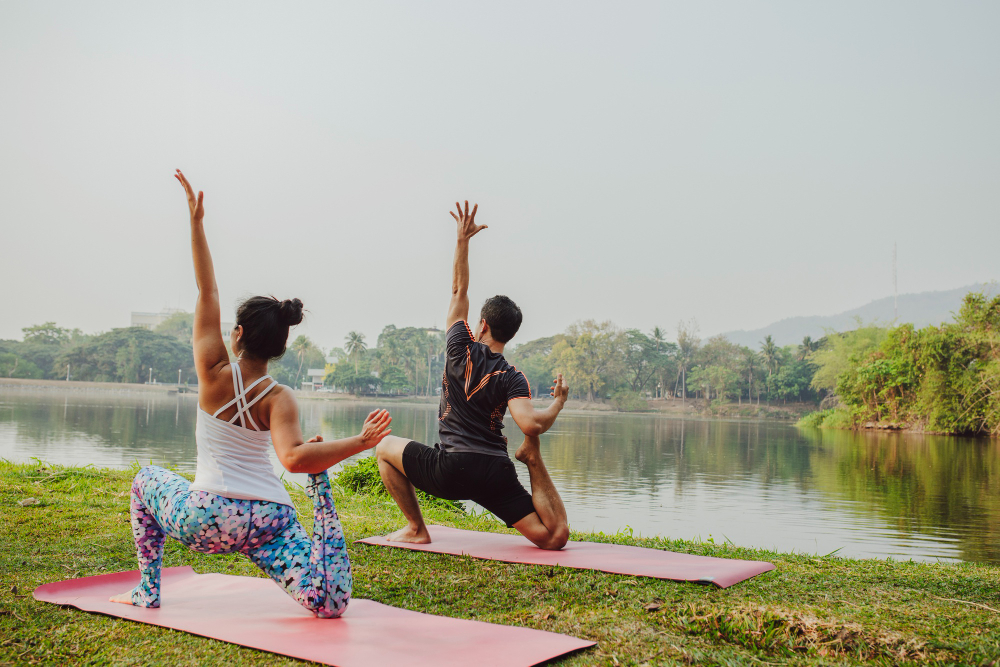Holistic fitness is an approach to well-being that considers the whole person–mind, body, and spirit—rather than focusing solely on physical exercise or specific health goals. It emphasizes the interconnectedness of various aspects of life and aims to promote overall harmony and balance. Here are key elements that define holistic fitness:
- Mind-Body Connection:
- Holistic fitness recognizes the intimate connection between the mind and body. Mental and emotional well-being is considered just as important as physical health.
- Physical Fitness:
- While holistic fitness encompasses more than just physical exercise, it acknowledges the importance of movement and activity for overall health. It encourages a diverse range of physical activities that align with individual preferences and needs.
- Nutrition and Diet:
- Holistic fitness emphasizes the role of nutrition in supporting overall health. It goes beyond calorie counting, focusing on nourishing the body with whole, nutrient-dense foods to optimize physical and mental function.
- Mental and Emotional Well-being:
- Holistic fitness addresses mental and emotional health through practices such as mindfulness, stress management, and emotional resilience. It recognizes the impact of thoughts and emotions on physical health.
- Spiritual Well-being:
- This aspect involves connecting with a sense of purpose, meaning, or spirituality. It doesn’t necessarily have to be tied to a specific religious belief but encourages individuals to explore their own values and beliefs.
- Sleep and Rest:
- Holistic fitness recognizes the importance of adequate sleep and rest for overall well-being. Quality sleep is essential for physical recovery, cognitive function, and emotional balance.
- Social Connections:
- Relationships and social connections are considered integral to holistic fitness. Building and maintaining positive connections with others contribute to mental and emotional health.
- Environmental Awareness:
- Holistic fitness acknowledges the impact of the environment on well-being. This includes aspects such as spending time in nature, reducing exposure to environmental toxins, and cultivating a healthy living environment.
- Holistic Practices:
- Practices like yoga, meditation, tai chi, and qigong are often incorporated into holistic fitness routines. These activities promote physical flexibility, mental clarity, and a sense of inner peace.
- Lifelong Learning:
- Holistic fitness encourages continuous learning and personal development. This can include acquiring new skills, exploring creative pursuits, and expanding one’s knowledge base.
- Individualized Approach:
- Holistic fitness recognizes that each person is unique, and there is no one-size-fits-all approach to well-being. It encourages individuals to tailor their fitness and wellness practices to suit their own preferences and needs.
In essence, holistic fitness seeks to create a holistic lifestyle that supports overall health and well-being in all aspects of life. It emphasizes the integration of physical, mental, emotional, and spiritual components to achieve a balanced and fulfilling existence.
Holistic Fitness for Mental and Physical Well-being
Holistic fitness for mental and physical well-being involves a comprehensive approach that considers the interconnectedness of various aspects of life. Here are key principles and practices to promote holistic well-being:
- Mindful Movement:
- Practice: Engage in mindful movement practices such as yoga, tai chi, or qigong. These activities combine physical exercise with mindfulness, promoting flexibility, balance, and mental focus.
- Benefits: Enhances physical fitness, reduces stress, and cultivates a mind-body connection.
- Balanced Nutrition:
- Practice: Adopt a balanced and whole-foods-based diet, emphasizing a variety of nutrient-dense foods. Consider individual nutritional needs and focus on mindful eating.
- Benefits: Supports physical health, provides sustained energy, and positively influences mood.
- Mindfulness Meditation:
- Practice: Incorporate mindfulness meditation into your routine. Focus on your breath, observe thoughts without judgment, and cultivate present-moment awareness.
- Benefits: Reduces stress, enhances emotional well-being, and improves attention and concentration.
- Quality Sleep:
- Practice: Prioritize good sleep hygiene by maintaining a consistent sleep schedule, creating a restful sleep environment, and practicing relaxation techniques before bedtime.
- Benefits: Supports physical recovery, boosts mood, and enhances cognitive function.
- Stress Management:
- Practice: Explore stress management techniques such as deep breathing, progressive muscle relaxation, or activities that bring joy and relaxation.
- Benefits: Reduces the negative impact of stress on both mental and physical health.
- Social Connections:
- Practice: Cultivate and nurture positive social relationships. Spend time with friends, family, or participate in group activities that promote a sense of community.
- Benefits: Supports emotional well-being, reduces feelings of isolation, and contributes to overall happiness.
- Nature Connection:
- Practice: Spend time in nature, whether it’s through outdoor walks, hikes, or simply enjoying natural surroundings. Connect with the environment.
- Benefits: Enhances mood, reduces stress, and promotes a sense of calm and well-being.
- Holistic Workouts:
- Practice: Include a variety of exercises in your routine, incorporating cardiovascular, strength, flexibility, and balance training. Choose activities you enjoy to make fitness a sustainable part of your lifestyle.
- Benefits: Improves physical fitness, boosts mood, and supports overall health.
- Lifelong Learning:
- Practice: Engage in activities that stimulate your mind, whether it’s learning a new skill, pursuing a hobby, or exploring new subjects.
- Benefits: Promotes cognitive health, adds a sense of purpose, and enhances overall well-being.
- Mindful Breathing:
- Practice: Practice mindful breathing exercises to bring awareness to your breath. This can be done throughout the day, especially during moments of stress.
- Benefits: Calms the nervous system, improves focus, and supports relaxation.
- Holistic Self-Care:
- Practice: Implement holistic self-care practices, including activities that nourish your mind, body, and spirit. This may include massage, aromatherapy, or self-reflection.
- Benefits: Enhances overall well-being, reduces burnout, and fosters a sense of self-compassion.
Remember that holistic fitness is a personal journey, and the practices you choose should align with your preferences and needs. Consistency and a mindful approach to these practices contribute to sustained mental and physical well-being.

Importance of mind-body wellness
Mind-body wellness is essential for overall health and well-being, recognizing the intricate connection between mental and physical aspects of an individual’s life. Here are key reasons highlighting the importance of mind-body wellness:
- Holistic Well-being:
- Mind-body wellness takes a comprehensive approach to health, addressing physical, mental, and emotional aspects. This holistic perspective contributes to a more balanced and fulfilling life.
- Reduced Stress and Anxiety:
- Practices that promote mind-body wellness, such as mindfulness and relaxation techniques, are effective in reducing stress and anxiety. Managing stress positively impacts both mental and physical health.
- Enhanced Mental Clarity and Focus:
- Mind-body practices, including meditation and mindful exercises, improve mental clarity and focus. This heightened awareness positively influences decision-making and cognitive abilities.
- Improved Physical Health:
- The mind and body are interconnected, and the state of one can influence the other. Maintaining good mental health can positively impact physical health, contributing to a stronger immune system and overall vitality.
- Emotional Resilience:
- Mind-body wellness fosters emotional resilience, helping individuals navigate challenges and bounce back from setbacks. It equips individuals with coping mechanisms to manage emotions effectively.
- Positive Impact on Chronic Conditions:
- Conditions such as cardiovascular diseases, diabetes, and chronic pain can be influenced by both mental and physical factors. Mind-body wellness practices can complement traditional medical approaches, improving overall health outcomes.
- Promotion of Healthy Lifestyle Habits:
- Adopting mind-body wellness practices encourages individuals to make healthier lifestyle choices, including balanced nutrition, regular exercise, and sufficient sleep.
- Enhanced Quality of Sleep:
- Mindfulness and relaxation techniques contribute to better sleep quality. Quality sleep is crucial for physical recovery, mental well-being, and overall health.
- Mind-Body Connection:
- The mind and body communicate continuously, and practices such as yoga, tai chi, and meditation strengthen this mind-body connection. Understanding and nurturing this connection promotes overall well-being.
- Prevention of Burnout and Mental Exhaustion:
- Mind-body wellness practices provide tools for managing stress and preventing burnout. Regular self-care and mindfulness help individuals recharge and maintain resilience in the face of challenges.
- Positive Impact on Mood and Happiness:
- Engaging in activities that promote mind-body wellness, such as exercise, nature walks, and social interactions, releases endorphins and serotonin, contributing to a positive mood and increased happiness.
- Enhanced Self-Awareness:
- Mind-body wellness practices foster self-awareness, helping individuals recognize and understand their thoughts, emotions, and physical sensations. This self-awareness is foundational for personal growth and well-being.
- Support for Mental Health Conditions:
- Mind-body practices are often integrated into mental health treatment plans. They can provide additional support for conditions such as depression, anxiety, and PTSD, promoting a holistic approach to mental health care.
- Improved Relationships:
- Balancing mental and physical well-being positively influences interpersonal relationships. When individuals are in a good mental and emotional state, they are better equipped to connect with and support others.
In essence, mind-body wellness is a vital component of a healthy and fulfilling life. By recognizing and nurturing the interconnectedness of mental and physical health, individuals can cultivate resilience, joy, and an overall sense of well-being.
Best integrated well-being workouts
Integrated well-being workouts aim to address both the physical and mental aspects of health in a holistic manner. Here are some effective and well-rounded workouts that promote integrated well-being:
- Yoga:
- Components: Yoga combines physical postures (asanas), breathwork (pranayama), and meditation.
- Benefits: Enhances flexibility, strength, and balance while promoting relaxation and mindfulness.
- Pilates:
- Components: Pilates focuses on core strength, flexibility, and overall body awareness.
- Benefits: Improves posture, core stability, and mental concentration.
- Mindful Running or Walking:
- Components: Incorporate mindfulness into your running or walking routine by paying attention to your breath, surroundings, and bodily sensations.
- Benefits: Boosts cardiovascular fitness, enhances mental clarity, and reduces stress.
- Tai Chi:
- Components: Tai Chi involves slow, flowing movements, deep breathing, and a focus on mindfulness.
- Benefits: Improves balance, flexibility, and mental relaxation.
- Dance Workouts:
- Components: Dance workouts, such as Zumba or dance aerobics, combine cardiovascular exercise with rhythmic movements.
- Benefits: Enhances cardiovascular fitness, coordination, and mood.
- Functional Fitness Training:
- Components: Functional fitness involves movements that mimic everyday activities, incorporating strength, flexibility, and balance exercises.
- Benefits: Supports overall physical function and well-being.
- Mindful Strength Training:
- Components: Combine strength training exercises with mindfulness techniques, focusing on proper form and breath control.
- Benefits: Builds muscular strength, improves body awareness, and reduces stress.
- HIIT with Mindfulness Intervals:
- Components: High-Intensity Interval Training (HIIT) interspersed with mindfulness intervals, incorporating breath awareness and relaxation.
- Benefits: Boosts cardiovascular fitness, burns calories, and promotes mental focus.
- Nature-Based Workouts:
- Components: Exercise outdoors, incorporating activities like trail running, hiking, or outdoor yoga.
- Benefits: Enhances physical fitness while providing the therapeutic benefits of nature.
- Rowing Workouts:
- Components: Rowing workouts, whether on a machine or in a boat, engage both the upper and lower body.
- Benefits: Builds cardiovascular endurance, strength, and promotes a sense of tranquility.
- Mindful Swimming:
- Components: Combine swimming with mindfulness, focusing on the sensation of the water, breath control, and rhythmic movements.
- Benefits: Improves cardiovascular fitness, flexibility, and mental relaxation.
- Circuit Training with Mindfulness:
- Components: Design a circuit training routine that includes strength exercises, cardio, and mindfulness intervals.
- Benefits: Provides a full-body workout while incorporating mental focus and relaxation.
- Mindful Stretching Routine:
- Components: Design a stretching routine that focuses on each muscle group, incorporating breath awareness and relaxation.
- Benefits: Enhances flexibility, relieves tension, and promotes mental calmness.
- Martial Arts:
- Components: Martial arts, such as karate or taekwondo, involve a combination of physical movements, discipline, and mental focus.
- Benefits: Improves physical fitness, coordination, and mental resilience.
Remember to tailor these workouts to your fitness level and preferences. Combining physical activity with mindfulness can lead to a more integrated and fulfilling well-being routine.

